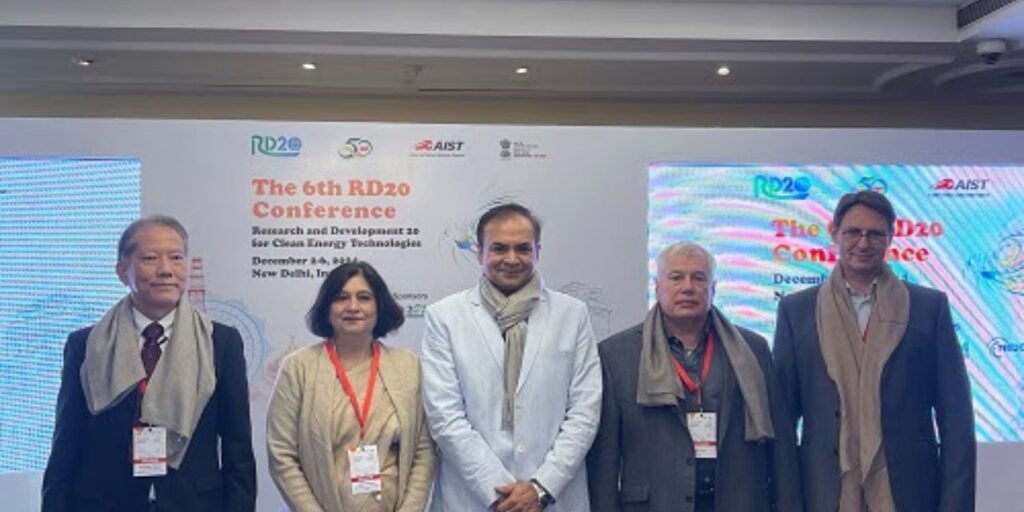Global cooperation for renewable energy technology is the main topic of the conference.

Global research leaders at the inaugural session
Delhi, India’s New Delhi
At the India Habitat Centre in New Delhi, the 6th RD20 Conference, a distinguished international platform for developing clean energy solutions, got underway today. This conference, which is being hosted outside of Japan for the first time and highlights India’s leadership in global energy innovation, is organised by The Energy and Resources Institute (TERI) in partnership with the Ministry of New and Renewable Energy (MNRE). Leading research institutes, business leaders, and G20 politicians will come together for five days to discuss creative methods to reach carbon neutrality through improved global cooperation in the clean energy sector.
The RD20 platform, which was introduced in 2019, acts as a worldwide centre for sharing research, best practices, and ideas in order to tackle urgent energy issues. It enables global partnerships that speed up the creation and use of innovative technologies, especially in fields like renewable energy, life cycle analysis (LCA), green hydrogen, and sustainable biofuels.
The Director General of TERI, Dr. Vibha Dhawan, greeted the attendees and emphasised the value of innovation. It is a major accomplishment for TERI to hold the RD20 Conference in India as a member of the RD20 organisation, demonstrating the company’s dedication to developing and implementing renewable energy solutions. We take the green route and wish to demonstrate to the world that growth and carbon footprint reduction are both achievable,” she stated.
Shri PK Singh, Secretary of the Ministry of New and Renewable Energy (MNRE) and the event’s “Guest of Honour,” stated in his introductory remarks that MNRE has influenced the nation’s renewable energy landscape and is assisting India in its transition to clean energy. With an emphasis on biofuel, bioenergy, and green hydrogen—topics we are enthusiastic about—it is wonderful to see India hosting the RD20 for the first time. We want to become a world leader in this area and collaborate to make the world cleaner and greener,” he continued.
Discussions on sustainable biofuels and green hydrogen technologies were part of the technical sessions on the first day. “Green hydrogen is a unique solution to reach the challenging net zero goals,” stated Mr Pierre Serre-Combe, Deputy Director, CEA, France, who led the hydrogen session. The objective is to determine technological obstacles and difficulties related to the transportation, storage, and end-use of hydrogen, as well as research and development initiatives to overcome such obstacles and possible cooperative possibilities.
The Director of R&D of Indian Oil Corporation Ltd. (IOCL), Shri Alok Sharma, spoke on the prospects and difficulties associated with hydrogen from an Indian point of view. “The outlay for different hydrogen projects, up to 2029-30, is Rs 455 crore for low carbon steel projects, Rs 496 crore up to 2025-26 for mobility pilot projects, Rs 115 crore up to 2025-26 for shipping pilot projects, and Rs 400 crore up to 2025-26 for hubs and other projects,” he said, sharing his thoughts on the National Green Hydrogen Mission.
“We need to work together within India, both domestically and internationally, as innovations are key for achieving high performance in bio-refineries,” said Dr. Sangita Kasture, Advisor and Head of Bioenergy, MNRE, in reference to the developments in biofuels and their role in a circular economy. Increased governmental and private sector investments are vital for increasing the proportion of bioenergy in the renewable energy landscape, and cooperation is necessary to solve current problems.
The hydrogen technical session focused on long-term fixes for a circular economy. The worldwide problems and solutions in the hydrogen industry were clarified by Prof. Dr. Christopher Hebling of the Fraunhofer Institute in Germany. He said, “We cannot just come down and decrease our energy demand,” in reference to the factors that are predicted to fuel the anticipated rise in energy demand worldwide. The usage of seawater desalination is growing, and other factors include artificial intelligence, negative emission technologies, space emissions, hydrogen-based energy carriers and chemical feedstock, electrification and rising energy consumption, and more.
India’s goals for a sustainable energy transition using green energy were discussed in the afternoon sessions. According to Dr. AK Tripathi, Scientist G, MNRE, “India wants to use non-fossil fuel-based energy systems to reach net zero emissions by 2017, with a short-term target of 500 gigawatts.” The nation has now reached 46% of its goal of reducing cumulative electric power installments to 50% fossil fuel resources by 2030. Reducing GDP emission intensity by 45% of 2005 levels is the fourth goal. India is trying to cut back on the use of fossil fuels in key industries like gas and power production.
Dr. Mitsuharu Oguma of AIST in Japan spoke on biodiesel, its features, feedstock, and the significance of fuel quality management, highlighting its applicability in a number of nations. According to him, the Economic Research Institute for ASEAN and East Asia, or ERIA, is a global effort to reduce pollution. Furthermore, oxidative stability has an impact on fuel tank corrosion, with particular reference to BBD (Biodiesel Blend Diesel).
Building collaborative research projects, tackling common issues, and encouraging collaborations between government, business, and academia are the objectives of the RD20 Conference. At a closed-door leader’s session workshop at the end of the event, G20 members will map out practical partnerships to get over technical, legislative, and financial obstacles in clean energy.
The conference, which runs until December 6, will help build the path for global sustainable energy cooperation through technical workshops, policy dialogues, collaborative talks, and a technical site tour. As India’s RD20 representative, TERI keeps pushing forward worthwhile initiatives that strengthen India’s position as a leader in the worldwide shift to carbon neutrality.
